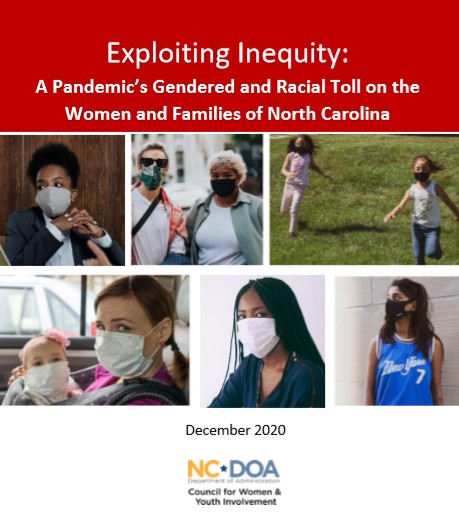
Special to Iredell Free News
RALEIGH — The N.C. Department of Administration’s Council for Women Advisory Board has released a report on the impact of COVID-19 on women in North Carolina.
“Exploited Inequity: A Pandemic’s Gendered and Racial Toll on the Women and Families of North Carolina” presents findings on health and safety, economy and education, and civic and political life of women in North Carolina.
The report is supplementary to previous Status of Women in North Carolina reports published by the NC Council for Women and Youth Involvement in partnership with the Institute for Women’s Policy Research. While the majority of the Status of Women reports pre-date the pandemic, this report features interviews with North Carolina women on how the pandemic has impacted their lives and includes a national conversation on race and equity.
“The pandemic has put a spotlight on many long-standing inequities and disparities facing both women and communities of color,” said N.C. Department of Administration Secretary Machelle Sanders. “It’s long overdue and it’s time that we address the issues that plague these communities for a brighter and better North Carolina.”
Key findings from the report indicate that women — particularly Black women, Indigenous women, and other women of color — are disproportionately impacted by COVID-19. Women in North Carolina are taking on additional caregiving responsibilities leading to increased mental health challenges and increased economic stress.
The report indicates that women are leaving the workforce at significantly higher rates than men and are reporting increased food and housing insecurity. Women who are still working represent a disproportionate share of the essential workforce, and therefore are more likely to risk exposure to the novel coronavirus.
Furthermore, women interviewees across all demographic groups reported fear in exercising civil and political rights due to risks associated with the pandemic and fears surrounding the increasing demonstrations of racial violence.
Policy recommendations in the report reinforce recommendations from the Status of Women in North Carolina reports for improving employment and earnings, health and wellness, and political participation.
Recommendations
Recommendations outlined in the report include the following:
♦ Medicaid expansion;
♦ Mandate paid leave for NC families;
♦ Sustain CARES Act level funding for domestic violence and sexual assault programs and provide emergency support for child welfare; and
♦ Increase public and private sector investment in women- and minority-owned businesses and provide technical assistance to women
To read the full report including a comprehensive list of recommendations, visit the NC Council for Women and Youth Involvement’s website. The report is available in both English and Spanish.
Further plans for the report include communicating recommendations to key stakeholders and engaging partner organizations in conversations on advocacy related to the unique needs of women in North Carolina.



